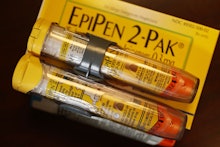The $300 generic EpiPen from Mylan shows drug pricing is broken in the United States

When is it tone deaf to say, "I'm running a business"?
How about: in response to criticism that your company has hiked the price of a lifesaving device by more than 400% in less than a decade — the same period over which your pay rose more than 600%.
But that's exactly what Mylan CEO Heather Bresch told CNBC, the same day the drugmaker announced it would start offering a savings card to halve the cost of EpiPens, which are used to quickly treat the growing ranks of people with severe allergies.
When detractors pointed out that the card would be virtually useless for many people because of regulatory quirks, Mylan again retooled, announcing Monday it would start offering a generic version of the EpiPen for $300 per carton.
Never mind that that is still three times higher than in 2008, when a pack cost only about $100.
Criticism has been harsh. Bresch has been likened to Martin Shkreli, the "Pharma Bro" executive known and hated for hiking the price of AIDS therapy Daraprim by 5,000%. Some have even dubbed her "Pharma Bitch" and compared her to Nazi abettors.
What really matters: As distasteful as pharmaceutical CEOs may seem, focusing on one-off personalities and one-off price hikes is, arguably, a distraction from the bigger picture: the ballooning pharmaceutical crisis in the United States.
To call it a crisis is less hyperbolic than you might realize.
Emergency room drug shortages have shot up by more than 400% during the last decade, while crucial therapies for cancer now cost tens and even hundreds of thousands of dollars — with little transparency from pharmaceutical firms as to why.
Drug company mergers are one reason for the shortages, as well as for the rise in prices for drugs and devices like the EpiPen.
Forget patents, long criticized for increasing costs for consumers: There's so little competition in the U.S. pharma industry today that companies don't even need patents to profit from monopolies on specific medications.
Compounding the problem of pharma consolidation is the fact that the Food and Drug Administration has a long backlog of generic drugs yet to be approved.
A potential solution could be for the FDA to explicitly fast track any generic drugs with only one existing competitor, as Harvard Medical School professors Jerry Avorn and Aaron Kesselheim have suggested in Health Affairs' blog. Another could be to loosen standards so Americans can access cheaper drugs produced in other developed countries, they wrote:
"The FDA should be permitted and encouraged to approve a generic product based on data already collected, if that product has been approved by a regulatory authority in another advanced country that enforces standards for good manufacturing practices that are as high as its own. Just as states within the U.S. recognize driver's licenses issued by other states, it is possible to identify drug regulatory bodies in other nations that have sufficiently rigorous procedures in place and recognize their certification of a given generic product."
There's a case for adopting more than just foreign drugs. State-run health care systems abroad are far better at negotiating with pharma companies and getting competitive prices for consumers. Two milligrams of Eylea, used to treat a common cause for blindness, costs more than $1,900 under Medicare but only about $900 in Norway, for example.
Yet another challenge in the United States is cost transparency.
Drugmakers often point to studies showing high prices are necessary because they spend billions of dollars on research and development. But it's hard to know for sure, without rules requiring companies to disclose the logic behind their pricing schemes.
Finally, there's the problem of awareness: Despite a steady rise over the last decade, the price of EpiPens are likely only getting attention now because parents are increasingly likely to be on high-deductible insurance plans — which means they are paying out of pocket this back-to-school season.
The good news for those who don't want to shell out $300 on EpiPen packs?
There are alternatives that cost between $20 and $140.